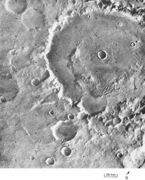Astronomy:Kaiser (crater)
Template:Infobox Mars crater Kaiser is a crater in the Noachis quadrangle of Mars, located at 46.6° S and 340.9° W. It is 207 km wide and was named after Frederik Kaiser, a Dutch astronomer (1808–1872).[1] Debris flows have been observed on some of the dunes in this crater. Some researchers believe that they may be caused by liquid water. Liquid water could be stable for short periods of time in the summer in the southern hemisphere of Mars. These gully-like debris flows may be due to small amounts of ice melting.[2]
Nearby prominent named craters include Le Verrier to the north, Proctor to the east and Russell nearly to the southwest, and Asimov to the west. South of Kaiser crater are the Chalcoporos Rupes.
Inside Kaiser are smaller craters, one nearly touching the smaller rim, another in the mid-northeast, a slightly large one near the middle and in the middle south is a smaller crater named Moni located in the elevated portion at [ ⚑ ] 47°01′S 18°46′W / 47.01°S 18.77°W, the latter crater was recently named on June 29, 2015 after a place on the island of Cyprus.[3]
Images
Viking Orbiter image of Kaiser
Detail of south wall of Kaiser, daytime infrared, imaged by the Thermal Emission Imaging System on board the 2001 Mars Odyssey orbiter.
Importance
The density of impact craters is used to determine the surface ages of Mars and other solar system bodies.[4] The older the surface, the more craters present. Crater shapes can reveal the presence of ground ice.
The area around craters may be rich in minerals. On Mars, heat from the impact melts ice in the ground. Water from the melting ice dissolves minerals, and then deposits them in cracks or faults that were produced with the impact. This process, called hydrothermal alteration, is a major way in which ore deposits are produced. The area around Martian craters may be rich in useful ores for the future colonization of Mars.[5]
See also
- Barchan
- Impact crater
- Impact event
- List of craters on Mars
- Noachis quadrangle
- Ore resources on Mars
- Planetary nomenclature
References
- ↑ "Kaiser (crater)". Gazetteer of Planetary Nomenclature. USGS Astrogeology Research Program.
- ↑ Reiss, D, R. Jaumann. 2003. Recent debris flows on Mars: Seasonal observations of the Russell Crater dune field. Geophysical Research Letters: 30, 1321.
- ↑ "Gazetteer of Planetary Nomenclature | Moni on Mars". International Astronomical Union. http://planetarynames.wr.usgs.gov/Feature/15331. Retrieved September 7, 2017.
- ↑ http://www.lpi.usra.edu/publications/slidesets/stones/
- ↑ http://www.indiana.edu/~sierra/papers/2003/Patterson.html.
External links
- Active Dune Gullies in Kaiser Crater - HiRISE
- Kaiser Crater (direct link)
- High resolution video by Seán Doran of overflight of a small crater within Kaiser





